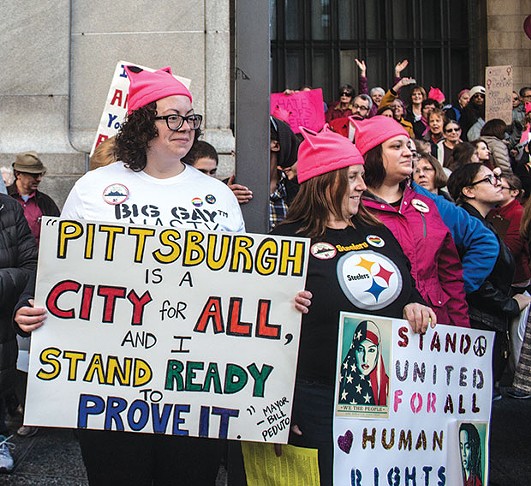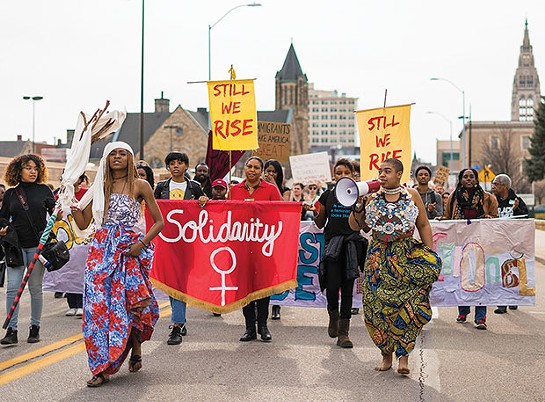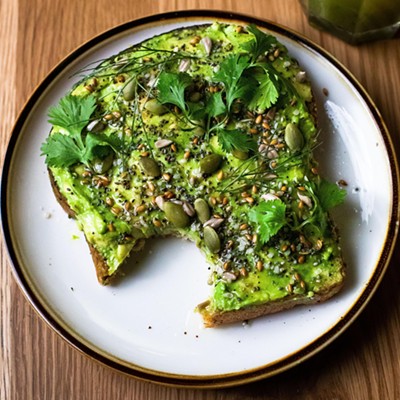It started with a Facebook comment. Two weeks ago, Celeste Scott posted on the event page for the Women’s March on Pittsburgh, a sister march to the national event planned for Washington, D.C., on Jan. 21.
“Is this a white feminism thing?” she asked.
What transpired in the coming days has left many feminists in Pittsburgh divided. Arguments erupted on the Pittsburgh march’s page. The event was cancelled and then back on, but without official recognition from the national organization. The organizing committee of the local march turned over a handful of times before the final organizers were able to secure the seal of approval from the national group.
Meanwhile, a group of black femme activists, including Scott, were organizing their own thing. And in the end, Pittsburgh ended up with two events on the same day: the Women’s March on Pittsburgh, Downtown, and Our Feminism Must Be Intersectional, a rally and march in East Liberty.
“I always like to ask accountability questions,” Scott says, reflecting on the initial Facebook comment. “I had no idea this would happen.”
It may have started with a simple Facebook comment, but from the furor emerged what many Pittsburgh activists say is a much-needed conversation on intersectional feminism. And it mirrors similar debates that have erupted out of the national March on Washington and other sister marches around the country.
“The impact I think we’ve had is people realizing that white feminism is trash and that they’ve been getting things wrong,” says Tresa Murphy-Green, one of the black femme organizers. (A femme is someone who identifies as feminine.) “That was the lesson for everybody, and it actually forced a lot of allies to come out and question their privilege.”
Intersectional feminism is a relatively new term. The concept of intersectionality was created by activist Kimberlé Crenshaw, in 1989, when she was a professor at the University of California, Los Angeles School of Law. Crenshaw was a keynote speaker at last year’s Women in the World Summit, where she talked about the origins of intersectional theory and the issues facing feminism today.
“Intersectionality was meant to draw attention to the way black women’s experience — sometimes distinct experience of gender discrimination — was buried under the experiences of white women,” Crenshaw said. “When feminism doesn’t contest the logics of racism, when anti-racism doesn’t contest the logics of patriarchy, they end up reinforcing them.”
Crenshaw’s statement is at the crux of why the black femmes who organized the East Liberty march opposed the Woman’s March on Pittsburgh. They say that when they tried voicing their concerns about the march’s lack of inclusivity, they were silenced and told they were being divisive.
“It’s about holding yourself accountable, being able to say ‘I messed up, I have issues,’ not make the other person feel bad for you messing up,” says Murphy-Green. “I feel like a lot more people have that understanding now. You have to be open to checking yourself and the views that you may have that you don’t even know you have. I think that’s the lesson in all of this.”
Intersectional feminism also means acknowledging the work black women are doing around social-justice issues and their role in the civil-rights movement over the past few decades. The organizers of Saturday’s East Liberty march also say it means centering black women and letting them lead.
“The only way we will get liberation is if we center black women,” says organizer Alona Williams. (Editor’s note: Williams, a student at Chatham College, is working this semester as City Paper’s music intern).
“This is a movement, not a moment,” Scott says. “Black femmes have been doing the foundation of this work and will continue to.”
But this is not your grandmother’s civil-rights movement. The organizers are bold and unapologetic. And some have even called them hostile.
At one point during the march in East Liberty, Murphy-Green turned her megaphone on a group of marchers to reprimand them. They had been shouting, “No Trump, no KKK, no racist USA.”
“This isn’t about Trump,” Murphy-Green shouted. And when chanting died down at one point, Murphy said, “You all have no problem being loud when it’s about Trump.”
“Marchers were screaming ‘pussy grabs back’ and ‘Eff Donald Trump’ and all that extra shit, and we had made it very, very clear that this was not an anti-Trump space,” Murphy-Green says. “So for people to not do their research, come to an event and get upset when you put them in line, it doesn’t make sense.
“People were equating womanhood with vaginas and not even realizing how harmful and hurtful that is to non-binary folks. Allies who came had to really check themselves the entire time.”
Context is important, the organizers say. Instead of labeling the East Liberty march organizers as mean, hostile or aggressive, they’re asking people to look at the message of inclusivity they’re sending, and they’re asking white feminist allies to be more introspective of their unconscious biases against people of color and the LGBT community.
“The angry-black-woman narrative is something we’ve always experienced,” says Murphy-Green. “It’s really easy to write us off as being aggressive, but were we really aggressive?”
“I hope people take away a good feeling. I hope everyone was able to walk away with that, even the people we had to tell to stop protesting Trump when we were marching,” says Murphy-Green. “I hope they have a better, clearer understanding of what it means to be an ally.”
One of those allies is Samey Jay. At the event on Saturday, she helped with logistics and she’s also offered herself as a resource to those looking for more information on intersectional feminism. Several white allies, such as Jay, have offered themselves as a resource to take the onus of explaining intersectional feminism from black women.
“I want to support a movement that really explores intersectional ideas, that are really trying to build something that doesn’t center the voices of middle-class white women,” Jay says.
But Jay’s sentiments weren’t so different from those expressed at the March on Pittsburgh a few miles away. In fact, it’s similar to what Bryn Alizeh Albee, one of many who flooded Downtown on Saturday, expressed as her motivation for marching.
“I wanted to come out here today to show unity with all the minorities who are subjected to the hateful rhetoric of our president,” Albee said. “We have to do what we can to ensure people’s rights aren’t trampled on.”
And Albee wasn’t the only one.
“I’m here because I think it’s really important. I know we can’t change the outcome of the election, but we’re not going to let hate determine the direction of our country,” said Sara Studebaker. “We’re not going to let fear and xenophobia push back the progress we’ve made.”
Talking with marchers like Studebaker shows that people in both marches have more in common than the controversy surrounding the events would suggest. Remove the focus on Trump, and they’re fighting for a lot of the same things.
“It’s good to see people with the same values, people that believe this country was built on equality and that we should be moving towards equal rights for everyone. We should be open to immigrants. We should be dismantling institutional racism. I just feel we’re in a critical moment, and if people are silent, then we’re tacitly complicit.”
Tazeen Chowdhury brought her family down to the march, including her son who was holding a sign that read “Love, not hate, makes America great.” A woman of color, she was there to rally for equal pay.
“I came to represent women from all around the world,” said Chowdhury. “Everyone’s got different issues, but in this administration, our voices need to be heard. This is history in the making.”
The Downtown Women’s March on Pittsburgh, which drew several thousand people, was realized largely thanks to the dedicated efforts of Tracy Baton.
Baton says, “I am excited that 25,000 Pittsburghers learned to put on their shoes and come out.” (Accounts vary as to how many attended, with some estimating closer to 5,000.) She continues: “I am glad that they learned that theirs are the only hands and feet that make democracy work.” The East Liberty march drew an estimated 2,000 participants.
Baton was on the original organizing committee for the Downtown march and took it over after the original clash between the black femme activists and some of the Facebook event page’s administrators. As a black woman, it was important to Baton that the march be inclusive.
“I was raised in the spirit of activism,” says Baton, whose mother was also a Pittsburgh activist. “I stood for my mother, I marched for my daughter, I lead for my city.”
However, Baton’s passion, and her status as a queer black woman, weren’t enough to protect her from the ire of the East Liberty march’s supporters. When Baton took over leadership, opponents of the Downtown march cried tokenism, a practice of appointing a person from underrepresented groups in order to deflect criticism of exclusivity.
People from both sides traded barbs for days across the two events’ Facebook pages before both groups largely shut down posting and commenting.
But despite the harassment she experienced in the since-deleted Facebook posts viewed by Pittsburgh City Paper, Baton does not speak ill of the organizers of the competing event. Instead, she says, they have a lot in common.
“Moving forward, it is important for the community to adjust and to accept the notion that racial justice has to be at the core of this movement,” Baton says. “They and I largely agree on most of the political issues.”
Now weeks after that first Facebook comment, organizers on both sides are quick to downplay the role the sister march played in the birth of the black femme rally.
“I think that event was always going to happen, but it had nothing to do with me or controversy; it was a wave,” says Baton.
“We focused in. This is about celebration,” says Scott, of the East Liberty march. “We left that in the past. That was like last year for us.”
“Oh, the other march, we don’t know her,” echoes her colleague Williams.






















